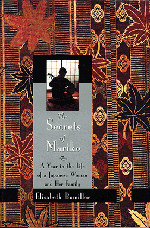GOLDSEA | ASIAN BOOKVIEW | NONFICTION
The Secrets of Marikoby Elisabeth Bumiller
Times Books, New York, 1995, 338pp, $25
A Year in the Life of a Japanese Woman and Her Family
EXCERPT:
 o one is really "typical," but Mariko did have much in common with the majority of women in her country. She believed, as do most Japanese women, that a woman's primary duty is to be at home with her children, and that motherhood is a vital job in her society. Only as I got to know her did I discover some of the emotional layers underneath the cheeful surface. In the beginning she told me she had a good, satisfying marriage, but later she said it felt sometimes like "putting one foot in the grave." Mariko also told me at first that she could not make sense of the talk about fulfillment in the workplace by leaders of Japan's small and fragmented women's movement. But after a family illness forced her to stay home for two months later in the year, she became depressed and said she realized she was much happier when she worked. She accepted the view that Japan's success rests on a complete division of labor between the sexes--that while the Japanese woman is wholly responsible for running the household and overseeing the education of the all-important next generation, the Japanese husband is free to pursue his work. And yet she later told me that there had been a bleak moment when she imagined, in a way that frightened her, what it would be like to walk out the door. "It would have been like throwing my whole history away--my parents, my children, my husband, my life," she said, recalling the fantasy. "All my memories would have been gone." Above all, Mariko was human.
o one is really "typical," but Mariko did have much in common with the majority of women in her country. She believed, as do most Japanese women, that a woman's primary duty is to be at home with her children, and that motherhood is a vital job in her society. Only as I got to know her did I discover some of the emotional layers underneath the cheeful surface. In the beginning she told me she had a good, satisfying marriage, but later she said it felt sometimes like "putting one foot in the grave." Mariko also told me at first that she could not make sense of the talk about fulfillment in the workplace by leaders of Japan's small and fragmented women's movement. But after a family illness forced her to stay home for two months later in the year, she became depressed and said she realized she was much happier when she worked. She accepted the view that Japan's success rests on a complete division of labor between the sexes--that while the Japanese woman is wholly responsible for running the household and overseeing the education of the all-important next generation, the Japanese husband is free to pursue his work. And yet she later told me that there had been a bleak moment when she imagined, in a way that frightened her, what it would be like to walk out the door. "It would have been like throwing my whole history away--my parents, my children, my husband, my life," she said, recalling the fantasy. "All my memories would have been gone." Above all, Mariko was human.
...

In that way the Tanakas were quite typical. So was their combined annual family income of $60,000, which, with three children, put them slightly below the average Japanese household income. Mariko and her husband, however, had more security than their earnings reflected. Unlike most Tokyo residents, they owned their home--the house they had left when they went to to live with Mariko's parents. The house, I later learned, still had most of its furniture and even a few plants, ready for the day when Mariko's parents died and she and her family moved back in. Takeshi had inherited the property, about two thousand square feet, from his father, and he and Mariko had built their home on part of it, with the help of an eighteen-year loan taken out against the value of the land. At the hyperinflated Tokyo real estate prices of the early 1990s, the two thousand square feet was worth $1 million; in today's recession it is worth probably half of that. Either way, the Tanakas had money only on paper. Each month, faced with the astronomical cost of living in Tokyo, Mariko had to juggle and scrape to make ends meet.
ASIAN AIR ISSUES FORUM |
CONTACT US
© 1999-2003 GoldSea
No part of the contents of this site may be reproduced without prior written permission.
